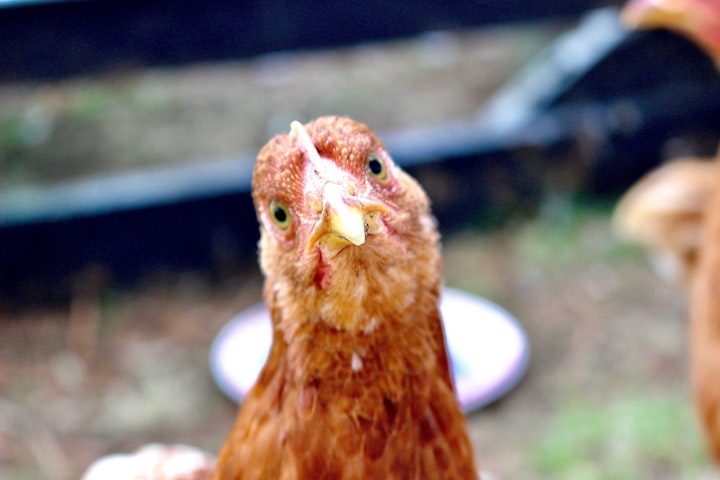
Now, listen. When we moved here, it’s not like we had no clue. We had some clue how things worked in the country. For instance, we knew about songbirds, they built nests in our Japanese Maple and Weeping Cherry. We knew too about wild animals: deer nibbled our lawn hostas and bedded nights in our day lilies. Squirrels scrambled through our attic and field mice through our pantry; wasps built assiduously behind our shutters, beneath our rafter awnings, and into the small screw holes of our rocking chairs. The peonies drooped tiny sugar ants, the hummingbirds bulleted across our deck, raccoons got into the trash after washing their hands in the cat’s water dish. We gawped and hawed at suburban streaked sunsets over goblets of burgundy on our porch swing, look at that we would cry. Would you just look at it.
But, nobody told us about the strawberry moon, so bright you can’t sleep for a week regardless of you not planting any strawberries. Nobody mentioned starless darkness so thick you swear twice you’re dead. Better sleep then, because the stars make it almost daylight most other summer nights. They box the night sky the way cicadas box your ears at twilight in the autumn and peepers in the spring.
Nobody mentioned the Eastern Screech Owl, though her name might have given it away. Screech is an entirely inferior description for the wailing horror you experience when she moves into your birch grove. Or how coyotes sound ravenous as roving zombies.
We knew about the cute little woodpecker, how he worked the telephone pole for insects. However.
Nobody breathed a word about the Turkey Buzzards living in the decrepit red barn out back. How they spread gangrene-slimed wing feathers each afternoon to dry as they perch in a line atop the apartment studio we keep for guests. Welcome. How Turkey Buzzards mate for life, returning each May to hatch two equally wet chick offspring so that all four sit hunched watching us, their heads turning slightly by degrees the way a creepy portrait follows you with its eyes around the room.
We thought we knew all about old houses as well. We complemented their charm and personality, their giant baseboards and vaulted ceilings, their exposed floors and plaster walls. As for ours, we guessed about the wiring: one outlet seemed sufficient until no modern plug fit, either the plug fell out of the socket or refused entry altogether. We accepted the lack of closets in that no one in the country wore clothes until 1925, nearly five years after our house was ordered and built from the Sears and Roebuck catalog. We also suspected that most early rural home dwellers measured in at about four foot five, four foot nine, as that explained the head clearance in the basement. We did not look twice at the only bathroom situated directly adjacent to the kitchen stove, as we ourselves had often wished a toilet closer when monitoring fudge or stirring gravy. What was puzzling was the lack of air flow when one attempted to move from the first to the second level. Mid stairs the air disappeared and as our bodies melted into the hundred year old shag carpeting, no one seemed the wiser. Also.
Nobody, nobody seemed to know a thing about how wood roaches come into the kitchen after a good rain, or a bad rain, or barely any rain at all, followed by giant black carpenter ants as big and cheeky and professional as California raisins, followed for four and a half weeks by hell’s own invention, the stink bug. As for the giant blue-black beetle whose diameter measures two inches across, larger than the lid of a coke can, and whose pinchers sliced through our screen door like it were made of butter, we discovered online its name: Electric Toe-Biter. Why God, why. Living in the country has opened our eyes.
Many lessons.
Never leave a porch light on after dusk. The movies that show southern families on their porch at night are complete bunk. What really happens is that every mosquito, moth and winged insect attempts to light on you at once, and lacking purchase will move on to cover any lit surface they can find. When the door to the house opens, they all move inside never to leave.
If it storms, fill the bathtub. That way if the power goes out you can still flush the toilets with a bucket. This is also true of snowfall, ice, high winds and drunk neighbors on four wheelers. Also sober neighbors. And any just passing through. In fact, since a power outage could happen at almost any time for any reason and is sure to last days, just get used to keeping the bathtub at about three inches full at all times.
Install lights. Install a second bathroom. Install a bedroom and pay double, triple, or just keep paying your builder indefinitely for each problem as it comes around. Forget closets. Well, build closets and then forget closet doors. Install ductless air conditioners and filters for the water and keep a cordless vacuum on hand for houseflies, wasps, ants and stink bugs. Get used to bending the prongs of most electric appliances and resetting fuses. Get used to concussing your head when you switch laundry from the washer to the dryer and again ninety minutes later as you attempt to bring dry clothes up cellar stairs built for training tiny European Cirque de Soleil gymnasts. Buy a generator. Install the proper hook up so the generator works. It is best to test its functionality before you need it.
If you take the barns down, prepare for barn swallows everywhere. They’re great for mosquitoes and for ruining your aluminum siding, your new paint job, your garage floor, car roofs and deck chairs due to their indiscriminate and constant pooping. Streams and piles of bird poop like nature’s own concrete will appear everywhere you don’t want it. Swallows live to shoot up and down any surfaces you just cleaned with your power washer, which will be all surfaces all of the time until you give the unwieldy gas one to your Amish friends and the electric one decides it won’t work.
Composting takes time. More time than you have to plant a garden. Although the idea of collecting your vegetable scraps seems Victorian-like and charming you will find yourself tilling and watering your compost more often than your actual garden plot. Carry a pitchfork at all times.
Buy galoshes, real rubber boots and keep them directly outside your door in all seasons.
Mud room is no misnomer. However, all rooms are in essence the mud room.
Rototillers do nothing when your soil is orange clay. Also, hills are a thing.
Lavender hates you, your yard, and your children. So do lilacs, hibiscus, most varieties of edible fruits and vegetables, and any plant that is not a weed, mold or a slug.
Finally, I want to teach you one more thing I learned from moving to the country.
Let go. Every day is tomorrow. What I mean is:
The weeds will continue. The rain won’t come or won’t stop or it will ice and sheet your driveway so you can’t leave until spring when your driveway thaws into a gushy aqueduct that floods your road and ships you away. For now, stay. Raise your plants inside and wait. Know the sun will be absent and the frost date absolute until Memorial Day, after that the sun will be relentless. Plan for early mornings because any work you try to do after eleven a.m. will be like walking through a creek in your jeans, slow, slick and cumbersome. Quit, shower, eat and plan to try again later.
The chickens lay eggs every day. Granted, these are not your chickens. These chickens belong to your industrious well-equipped neighbors who leave a lockbox outside their hen house and charge three dollars and fifty cents on the honor system. If you are baking a cake and send your son to buy eggs, have him check the storage for eggs before depositing your cash because there are no refunds in the country. Your son will relay what the neighbor’s son already knows: If the eggs run out today, just look tomorrow. You’ll see eggs. It’s like Little Orphan Annie, only your dog Sandy will be mangier, and come to think of it, probably not a dog, but a shaggy shrieking goat.
Speaking of goats, have you ever heard a goat scream? Now that is a sound no one can prepare you for. I don’t blame them for not mentioning it as it defies all descriptions known to human ears. However, the rest. Someone might have hinted. But then again, we might not have believed them.
Sometimes, you just need to experience it for yourself.
About the Creator
Rachel Pollock
Writer, storyteller, and Assistant Professor of Communication, Media and Theatre at Muskingum University in New Concord, Ohio Artistic Director of non-profit Big Fish Folklife https://www.bigfishfolklife.org/






Comments
There are no comments for this story
Be the first to respond and start the conversation.